Task force co-chairs say BU should "leave room for faculty to make their own decisions on generative AI policies they adopt for their classes"
BU Today / April 11, 2024
Love it, like it, or loathe it, artificial intelligence (AI) is here to stay. Responding to that reality, BU formed the Boston University AI Task Force in fall 2023 to examine the impact of generative AI tools “on education and research, and review existing policies adopted by BU schools, colleges, and other academic institutions.” It’s an exercise colleges across the country have undertaken as they seek to put in place guidelines and policies for a technology that is still new and still taking shape. Inside Higher Ed recently reported that of “universities making AI policies, nearly half of institutions (43 percent) are working with a third party to develop AI strategy, while 30 percent are working with peer institutions or networks and 22 percent are working with professional associations.”
BU’s task force met throughout the fall and into this spring, consulting with AI experts, talking with faculty, meeting with industry leaders, and ultimately writing a report that was released this month.
BU Today spoke with the two co-chairs of the task force, Yannis Paschalidis, Distinguished Professor of Engineering at the College of Engineering, a founding professor of computing and data sciences, and director of the Rafik B. Hariri Institute for Computing and Computational Science & Engineering, and Wesley J. Wildman, a professor of philosophy, theology, and ethics at the School of Theology, a founding professor of computing and data sciences, and chair of faculty affairs, Faculty of Computing & Data Sciences, about the new report.


